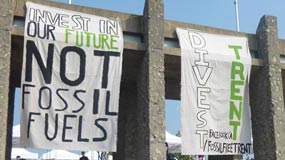

If you are reading this, then I’m assuming you didn’t flip the page when you saw yet another article about the divestment campaign. You may perhaps be wondering why Arthur is covering this topic in such a recurrent manner. For those of you who are wondering, here is your answer.
Diverting the investments from fossil fuel is not only a matter of tackling one of the main factors causing climate change, but also about tackling our misguided set of priorities as a society.
The divestment campaign advocates for the removal of the investments that Trent University has in the fossil fuel industry. It also calls for ethical consistency.
On one hand, Trent has one of the best Environmental Studies programs, and directs many resources into environmental research. It has also advocated for a switch towards the use of more renewable energies. However, on the other hand, it invests in the fossil fuel industry.
Trent invested in a fund called the TD Emerald Pooled Fund. All financial information about this fund can be found in an extensive report available online.
Julian Tennent-Riddel and Calvin Beauchesne, two of the most active Trent students in terms of the divestment campaign, talked to the Arthur.
Tennent-Riddel has been involved in environmental activism for about five years. He believes the divestment campaign is an excellent way to tackle climate change, and adds that while the divestment initiative first started within Sustainable Trent, it has extended to several committees.
Beauchesne states that the Fossil Free Trent branch of Sustainable Trent is focused on divestment. They are planning on meeting weekly to plan events, write petitions, and campaign for signatures in hopes that they can be brought up to the Board of Governors.
As one of their upcoming events, the group is planning a film screening of Do the Math, an environmental movie about climate change featuring Bill McKibben, who founded the divestment movement.
Fossil Free Trent has been in contact with Trent’s President and Vice-Chancellor, Dr. Steven Franklin, since last year, and their discussions have circled around how to approach the Board of Governors.
The group has been working on research and policy analysis. They want to understand the issue as thoroughly as possible by the time they get to discuss the initiative with the Board of Governors in December or January.
Tennent-Riddel is currently working on a project through the Trent Center for Community-based Education. He is looking at Trent’s investment policies by talking to administration personnel and financial experts to try to figure out how they could implement divestment. What are the barriers? How can they be overcome?
For Tennent-Riddel, fossil fuels represent one of the most profitable investments, as it is one of the biggest industries in Canada. However, it is not economically viable or morally responsible.
Beauchesne asserts that they are attempting to come up with investment alternatives which are sustainable, like renewable energy or investing on campus instead of investment through the stock market, which would get more returns in the long run.
One of the biggest challenges is to come up with investment alternatives in light of the present financial difficulties. Some argue that removing fossil fuel investments could have a negative economic impact.
On the other hand, divesting could have extremely positive long-term benefits.
Tennent-Riddel adds that the university is really concerned about their reputation, especially regarding donors and their economic support.
If Trent divests, it would show that the university is a strong environmental leader, and, in turn, would generate more support for its programs.
Beauchesne argues that if Trent is so environmentally friendly, its investments should reflect its inner practices, such as the extensive research conducted and funded through the environmental science program.
Beauchesne adds that, for the most part, students are supportive. However, there are some who are still concerned about the financial aspect.
We need to make sure alternatives to the investment, that are both sustainable and economically viable, are founds.
Climate changes, spills, and human rights violations have helped the movement gather momentum by presenting it as a way that we, as students, can do something to tackle such issues and make a statement.
Both Tennent-Riddel and Beauchesne agree that the fossil fuel industry has had a lot of political influence.
The Canadian government subsidizes the fossil fuel industry instead of redirecting resources towards, for example, renewable energy or sustainable agriculture.
If you want more information, you can follow the Fossil Free Trent group on Facebook.
